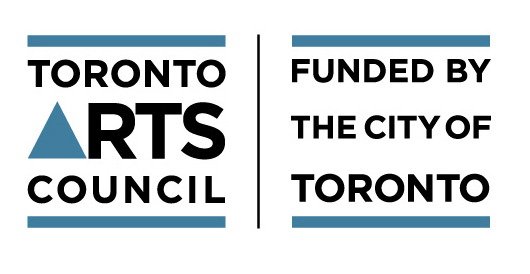AN INDIGO CHRISTMAS…NGUZO SABA & THE BLACK MADONNA
An indigo christmas…
nguzo saba & the black madonna
Welcome Note
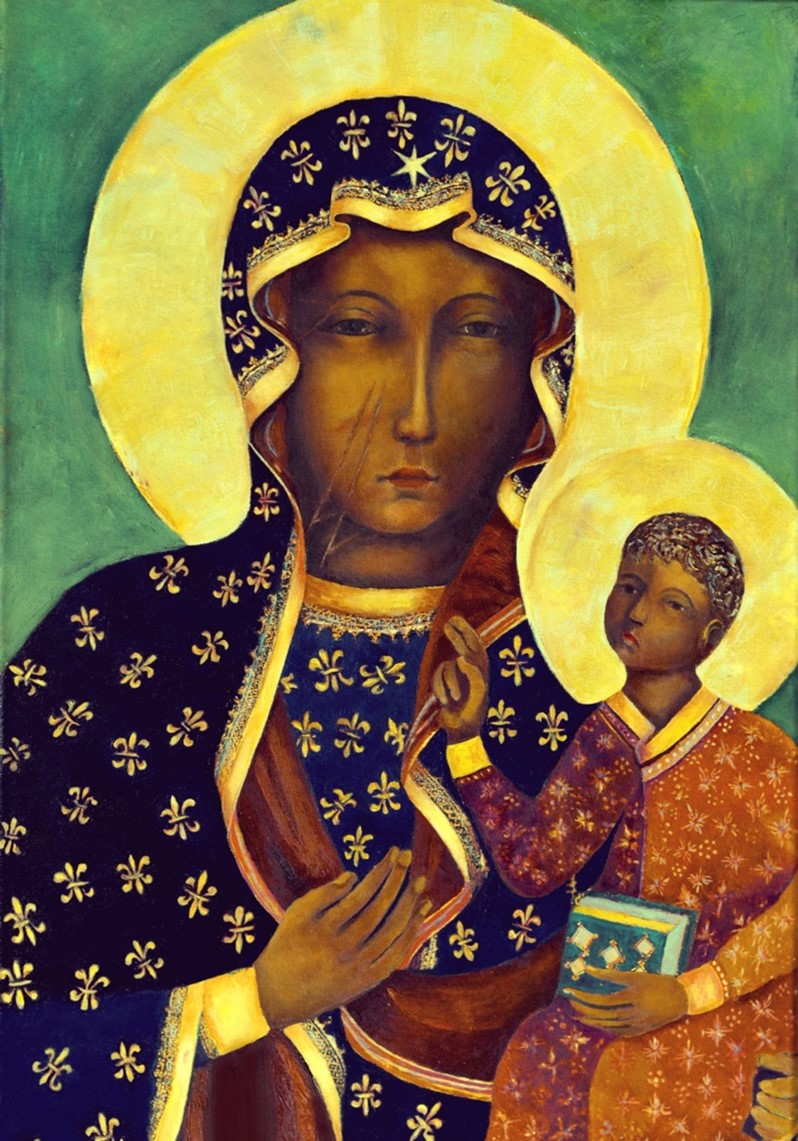
Welcome to An Indigo Christmas…Nguzo Saba & The Black Madonna. The word indigo calls to mind many things – colour, spirituality, mood, reverence, blues, soul, synthesis, unity, invocation, and ritual. Newton designated indigo as one of the seven prismatic or primary colours, and as such, it has a unique harmonic vibration and energy that seems fitting to surround a concert of Christmas and seasonal music with a distinct Afrocentric vibe.
Two major themes run through this evening’s concert. The first is a tribute to Mary, the quintessential mother, and through her to mothers around the world. As Mary gave birth to a child of promise over two thousand years ago, a child who became the symbol of freedom, peace and love, so mothers everywhere give birth daily to our hopes for the future.
The Black Madonna has been present in humanity’s history and collective psyche from time immemorial. For some she represents the Mother and Child, well beloved as an icon of Christianity. For others she is a reminder of the Goddess in traditions such as Egyptian, Greco-Roman, Hindu and Celtic that pre-date Christianity. For some she is a bridge to the peoples of African heritage. For others she is the sacred mystery protected by the Knights Templar and at the heart of the Merovingian bloodline. For some she is the second Eve connected by extension to the first Eve or Lilith of Hebrew folklore. And as the name Lilith suggests, to others she is the Dark Mother associated with the underworld, creation, death and re-birth.
There are many icons or statues of the Black Madonna around the world, with a particular concentration in Europe. Every year thousands make their pilgrimage to the shrines that are accessible, from commoners to popes, to royalty. Meditation on the Black Madonna is recorded as having miraculous effect, both on a personal and national scale. Indeed, three pieces of tonight’s program were written by Pawel Łukaszewski in praise of the Black Madonna of Częstochowa, known as the Queen of Poland.
In ancient times the Druids revered a virgo partitura, a virgin about to give birth at the site that is now Chartres Cathedral, dedicated to the Virgin Mary, Mother of God, and home to one of the most venerated Black Madonnas in Europe: Our Lady of the Pillar. Author Jean Markale contends that the mother and child depicted by the Black Madonna are not merely descendants of the Druids’ spiritual image of the virgin forever giving birth, but that she represents a notion of great refinement: “The Virgin gives birth ceaselessly to a world, a God, and a humanity in perpetual becoming.” The modern mystic Andrew Harvey states, “She very clearly represents the cost, the price, the anguish, and the sacred agony of the Divine Feminine in each of us…in The Black Madonna, you have the whole glory of the Sacred Feminine in one symbol.”
The second major theme of the evening is the festival of Kwanzaa and the Nguzo Saba associated with it. Kwanzaa is a Pan-African holiday that celebrates family, community, and culture. Commemorated from December 26 through January 1, its origins are in the first harvest celebrations of Africa, from which it takes its name. The name Kwanzaa is derived from the phrase “matunda ya kwanza” which means “first fruits” in Swahili, a Pan-African language which is the most widely spoken African language. The Kwanzaa festival builds on the five fundamental activities of Continental African “first fruit” festivities: ingathering, reverence, commemoration, recommitment, and celebration. Kwanzaa, then, is:
~ A time of ingathering of the people to reaffirm the bonds between them.
~ A time of special reverence for the creator and creation in thanks and respect for the blessings, bountifulness, and beauty of creation.
~ A time for commemoration of the past in pursuit of its lessons, and in honour of its models of human excellence, our ancestors.
~ A time of recommitment to our highest cultural ideals in our ongoing effort to always bring forth the best of African cultural thought and practice; and
~ A time for celebration of the Good, the good of life and of existence itself, the good of family, community, and culture, the good of the awesome and the ordinary, in a word the good of the divine, natural and social.
Dr. Maulana Karenga founded the organisation Us in response to the Watts riots in Los Angeles, California, USA in 1965. It is from this organisation and the philosophy of Kawaida that the celebration of Kwanzaa sprang. Dr. Karenga also states:
From the beginning, the essential task of our organisation Us has been and remains to provide a philosophy, a set of principles and a program which inspires a personal and social practice that not only satisfies human need but transforms people in the process, making them self-conscious agents of their own life and liberation. Such a transformative practice will, of necessity, also lead to the building of moral community and to the constant becoming of the best of what it means to be both African and human in the fullest sense.
The set of principles which we put forth are the Nguzo Saba (The Seven Principles): Umoja (Unity), Kujichagulia (Self-Determination), Ujima (Collective Work and Responsibility), Ujamaa (Cooperative Economics), Nia (Purpose), Kuumba (Creativity) and Imani (Faith). These Seven Principles are essential standards of personal and social excellence directed toward building and sustaining moral community, and strengthening and maintaining the community’s capacity to define, defend and develop its interests in the most positive and productive sense.
In addition to being standards of excellence, the Nguzo Saba are also categories of priorities and categories of human possibilities. As categories of priorities, they tell us some of the most important things in our lives, identifying a key set of views, values and practices which we should, even must, put first in our personal and social life. And as categories of possibilities, the Nguzo Saba, offer us a set of principles that encourage thought and practice which help define, develop, and enhance our humanity in the context of community and the world.
~Dr. Maulana Karenga~
As Founder and Artistic Director of The Nathaniel Dett Chorale, I have been profoundly influenced by the Nguzo Saba. They are very much a part of the vision, mission, and guiding principles of The Nathaniel Dett Chorale organisation, and I have personally sought to inculcate them into year-round practice. I trust that even as you enjoy the thrilling voices, harmonies, and rhythms tonight that you will indeed be infused with the spirit of Christmas and Kwanzaa in celebration of the Good, the good of life and of existence itself, the good of family, community, and culture; the good of the awesome and the ordinary – the good of the Divine.
It is thus, in a spirit of unity, self-determination, reverence and celebration, that I welcome you to the 25th annual An Indigo Christmas concert.
Peace, Love and Light.
Brainerd Blyden-Taylor
Artistic Director
AN INDIGO CHRISTMAS…
NGUZO SABA & THE BLACK MADONNA
Friday, December 15, 2023, 8:00 PM
St. Andrew’s Church
The Nathaniel Dett Chorale
D. Brainerd Blyden-Taylor, Artistic Director
Christina Faye, Collaborative Pianist
Jaideep Goray & Savannah Tomev, ASL-English Interpreters (Phoenix the Fire)
Programme
Welcome & Opening Remarks
Invocation
Kwanza Msingwana, drummer
Mary Had a Baby | Spiritual, arr. Roland Carter ((b. 1942)
Kaisha Lee, soprano
Ave Maria | Pawel Łukaszewski (b. 1968)
Salve Regina | Pawel Łukaszewski
Regina Caeli | Pawel Łukaszewski
Nigra Sum | Pau (Pablo) Casals i Defilló (1876-1973); arr. Edward Connell
Litanies à la Vierge Noire | Francis Poulenc (1899-1963); arr. Edward Connell
Mater Ora Filium | Arnold Bax (1883-1953)
Mary Had a Baby | Spiritual, arr. Craig Courtney ((b. 1948)
Matheus Coelho, baritone
Intermission
Nguzo Saba Suite, Op.41 |Glen Edward Burleigh (1949-2007)
1. Umoja (Unity)
2. Kujichagulia (Self-Determination)
3. Ujima (Collective Work and Responsibility)
4. Martin Gomes & Dérrell Woods, baritones
Ujamaa (Cooperative Economics)
5. Nia (Purpose)
6. Kuumba (Creativity)
7. Imani (Faith)/Finale
PROGRAMME TEXT
Mary Had a Baby – Roland Carter
Mary had a baby. Oh my Lord!
Mary had a baby. Oh my Lord!
Where was He born? Born in a manger low.
Where was He born? Born in a manger low.
Mary had a baby. Oh my Lord!
What did they call Him? Some call Him one thing
What did they call Him? But I’ll call Him another,
What did they call Him? Some say Immanuel
What did they call Him? I’ll call Him Sweet Little Jesus Boy
I’ll call Him Jesus
He is called King Jesus, Wonderful Counsellor,
Mighty God, Everlasting Father, He’s the Prince of peace.
Mary had a baby. Oh Yes, Oh my Lord!
Ave Maria – Pawel Łukaszewski
Ave Maria! Ave, Amen
Hail Mary! Hail, Amen
Salve Regina – Pawel Łukaszewski
Salve, Regina, mater misericordiae:
Vita, dulcedo, et spes nostra, salve.
Ad te clamamus, exsules, filii Hevae.
Ad te suspiramus, gementes et flentes
In hac lacrimarum valle.
Eia ergo, Advocata nostra,
Illos tuos misericordes oculos
Ad nos converte.
Et Jesum, benedictum fructum ventris
tui, nobis, post hoc exsilium ostende.
O clemens! O pia!
O dulcis Virgo Maria! Salve!
Hail, holy Queen, mother of mercy,
Our life, our sweetness, and our hope.
To thee do we cry, poor banished children of Eve.
To thee do we send up our sighs,
Mourning and weeping in this vale of tears.
Turn then, O most gracious Advocate,
Thine eyes of mercy towards us.
And after this, our exile,
Show unto us the blessed fruit
of thy womb, Jesus.
O clement! O loving!
O sweet Virgin Mary! Hail!
Regina Caeli – Pawel Łukaszewski
Regina caeli, laetare, alleluia, alleluia.
Quia quem meruisti portare, alleluia,
Resurrexit sicut dixit, alleluia, alleluia.
Ora pro nobis Deum, alleluia, alleluia.
O Queen of heaven, be joyful, alleluia, alleluia.
For He whom you have humbly borne for us, alleluia,
Has arisen, as He promised, alleluia.
Offer now our prayer to God, alleluia, alleluia.
Nigra Sum – Pau (Pablo) Casals i Defilló
Nigra sum, nigra sum, et formosa,
filiae Jerusalem;
Ideo dilexit me Rex,
et introduxit me in cubiculum suum,
Nigra sum, nigra sum, sed formosa,
filiae Jerusalem;
Ideo dilexit me Rex,
et introduxit me in cubiculum suum,
et dixit mihi;
Surge et veni amica mea,
surge et veni amica mea,
jam hiems transiit,
imber abiit et recessit,
jam hiems transiit,
imber abiit et recessit,
jam hiems transiit,
flores apparu erunt in terrat nostra,
tempus putationis ad venit.
Alleluia.
I am black, I am black and beautiful,
O daughters of Jerusalem,
Therefore, the King chose me,
And brought me into his chambers.
I am black, I am black and beautiful,
O daughters of Jerusalem,
Therefore, the King chose me,
And brought me into his chambers.
And said to me,
“Rise up and come, my friend,
Rise up and come, my friend.
For lo, the winter is past,
the rain is over and gone,
For lo, the winter is past,
the rain is over and gone,
For lo, the winter is past.
The flowers appear on the earth,
The time of renewal is come.”
Alleluia.
Litanies à la Vierge Noire – Francis Poulenc
Seigneur, ayez pitié de nous.
Jesus-Christ, ayez pitié de nous.
Jesus-Christ, écoutez-nous.
Jesus-Christ, exaucez-nous.
Dieu le père, créateur, ayez pitié de nous.
Dieu le fils, rédempteur, ayez pitié de nous.
Dieu le Saint-Esprit, sanctificateur, ayez pitié de nous.
TrinitéSainte, qui êtes un seul Dieu, ayez pitié de nous.
Sainte Vierge Marie, priez pour nous.
Vierge, reine et patronne, priez pour nous.
Vierge que Zachée le publicain nous a fait connaître et aimer,
Vierge à qui Zachée ou Saint Amadour éleva ce sanctuaire,
Priez pour nous, priez pour nous.
Reine du sanctuaire, que consacra Saint Martial,
Et où il célébra ses saints mystères,
Reine, près de laquelle s’agenouilla Saint Louis
Vous demandant le bonheur de la France,
Priez pour nous, priez pour nous.
Reine, à qui Roland consacra son épée, priez pour nous.
Reine, dont la bannière gagna les batailles, priez pour nous.
Reine, dont la main délivrait les captifs, priez pour nous.
Notre-Dame, dont le pélerinage est enrichi de faveurs specials,
Notre-Dame, que l’impiété et la haine ont voulu souvient détruire,
Notre-Dame, que les peuples visitent comme autrefois,
Priez pour nous, priez pour nous.
Agneau de Dieu, qui effacez les péchés du monde, pardonnez-nous.
Agneau de Dieu, qui effacez les péchés du monde, exaucez-nous.
Agneau de Dieu, qui effacez les péchés du monde, ayez pitié de nous.
Notre-Dame, priez pour nous,
Afin que nous soyons dignes de Jésus-Christ.
Lord, have pity on us.
Jesus Christ, have pity on us.
Jesus Christ, hear us.
Jesus Christ, grant our prayers.
God the Father, creator, have pity on us.
God the Son, redeemer, have pity on us.
God the Holy Spirit, sanctifier, have pity on us.
Holy Trinity, who are one single God, have pity on us.
Holy Virgin Mary, pray for us.
Virgin, queen and patron, pray for us.
Virgin, whom Zacchaeus the tax-collector made us know and love,
Virgin, to whom Zacchaeus or Saint Amadour raised this sanctuary,
Pray for us, pray for us.
Queen of the sanctuary, which Saint Martial consecrated,
And where he celebrated his holy mysteries,
Queen, before whom knelt Saint Louis
Asking of you good fortune for France,
Pray for us, pray for us.
Queen, to whom Roland consecrated his sword, pray for us.
Queen, whose banner won the battles, pray for us.
Queen, whose hand delivered the captives, pray for us.
Our Lady, whose pilgrimage is enriched by special favours,
Our Lady, whom impiety and hate have often wished to destroy,
Our Lady, whom the peoples visit as of old,
Pray for us, pray for us.
Lamb of God, who wipes out the sins of the world, pardon us.
Lamb of God, who wipes out the sins of the world, grant our prayers.
Lamb of God, who wipes out the sins of the world, have pity on us.
Our Lady, pray for us,
To the end that we may be worthy of Jesus Christ.
Mater Ora Filium – Arnold Bax
Mater ora Filium
Ut post hoc exilium
Nobis donet gaudium
Beatorum omnium. Amen
Mother pray thy Son
That, after this exile,
He may grant us the joy
Of all the blessed ones. Amen
Fair Maiden, Who is this bairn (child)
That thou bearest in thine arm?
Sir, it is a kinges son
That in Heaven above, doth wone. (that dwells in Heaven)
Mater ora Filium
Ut post hoc exilium
Nobis donet gaudium
Beatorum omnium. Amen
Mother pray thy Son
That, after this exile,
He may grant us the joy
Of all the blessed ones. Amen
Man to father He had none
But Himself God alone
Of a maiden He would be born
To save mankind that was forlorn.
Mater ora Filium
Ut post hoc exilium
Nobis donet gaudium
Beatorum omnium. Amen
Mother pray thy Son
That, after this exile,
He may grant us the joy
Of all the blessed ones. Amen
The kings brought Him presents (Alleluia)
Gold, myrrh, and frankincense (Alleluia)
To my son full of might. (Alleluia)
King of kings and Lord of Right. (Alleluia)
Mater ora Filium
Ut post hoc exilium
Nobis donet gaudium
Beatorum omnium. Amen
Mother pray thy Son
That, after this exile,
He may grant us the joy
Of all the blessed ones. Amen
Fair Maiden, Pray for us
Unto thy Son, Sweet Jesus
That He may send us of His grace.
In heav’n on high to have a place. (Alleluia)
Mater ora Filium
Ut post hoc exilium
Nobis donet gaudium
Beatorum omnium. Amen
Mother pray thy Son
That, after this exile,
He may grant us the joy
Of all the blessed ones. Amen
Mary Had a Baby – Craig Courtney
Mary had a baby, O Lord,
Mary had a baby, O my Lord,
Mary had a baby, O Lord,
The people keep a-comin’ and the train done gone.
Mary had a baby, Mary had a baby,
Mary had a baby, Mary had a baby.
Laid Him in a manger, O Lord,
Laid Him in a manger, O my Lord, they
Laid Him in a manger, O Lord,
I’m singin’ glory, glory, glory, (Laid Him in a manger)
Singin’ glory, glory, glory, (Laid Him in a manger)
Singin’ glory, glory, hallelujah (Laid Him in a manger)
The people keep a-comin’ and the train done gone.
Mary had a baby, Mary had a baby,
Mary had a baby, Mary had a baby.
Shepherds came to see Him, O Lord,
Shepherds came to see Him, O my Lord, the
Shepherds came to see Him, O Lord,
I’m singin’ glory, glory, glory, (Shepherds came to see him)
Singin’ glory, glory, glory, (Shepherds came to see him)
Singin’ glory, glory, hallelujah (Shepherds came to see him)
The people keep a-comin’ and the train done gone.
Mary had a baby, Mary had a baby,
Mary had a baby, O my Lord, yes,
Mary had a baby, Mary had a baby,
Mary had a baby, Mary had a baby.
Named Him King Jesus, O Lord,
Named Him King Jesus, O my Lord,
Named Him King Jesus, O Lord,
The people keep a-comin’ and
The people keep a-comin’ and
The people keep a-comin’ and
The people keep a-comin’,
The people keep a-comin’ and the train done gone.
People keep a-comin’ and the train done gone.
INTERMISSION
Nguzo Saba Suite, Op. 41 – Glenn Edward Burleigh
1. Umoja (Unity)
Text – Glenn Edward Burleigh and Psalm 133:1
Umoja! Unity.
Behold, how good and how pleasant it is
for people to dwell together in unity.
Umoja! Behold, how good and how pleasant it is
for all to live with each other in peace and unity.
Got to get together with each other.
We need Umoja!
Got to get together with each other, each other.
No more nations against nations.
No more kindred against tribe.
We need Umoja! Unity.
Umoja! Unity, Umoja! Umoja!
Stop that fighting and lend a hand.
We need Umoja!
Stop backbiting, together we must stand.
We need Umoja! (people, my people, O…)
Umoja! Unity.
No more nations against nations.
No more kindred against tribe.
We need Umoja!
Behold how good and pleasant it is to dwell in unity, Umoja!
2. Kujichagulia (Self-Determination)
Text – Glenn Edward Burleigh and Philippians 4:13
Kujichagulia!
Now that I have been set free, Kujichagulia!
I will be all I can be. Kujichagulia!
I can do all things, Kujichagulia!
Through Christ who strengthens me. I am determined!
Now that I have been set free, I, am,
I will be all I can be. Determined!
I can do all things, I, am,
Through Christ who strengthens me. Determined!
I am determined! I am determined!
Can’t hold me back.
Can’t hold me back no longer. (
I can soar on eagle’s wings. I can do all things, Kujichagulia!
Through Christ I can do all things. Kujichagulia!
I will reach my goal somehow. Kujichagulia!
Nothing can stop me now. I am determined!
I can soar on eagle’s wings. I, am,
Through Christ I can do all things. Determined!
I will reach my goal somehow.
Nothing can stop me now.
I am determined! I am determined!
Kujichagulia!
Can’t hold me back no longer.
I am determined. Kujichagulia!
3. Ujima (Collective Work and Responsibility)
Text – Glenn Edward Burleigh and Proverbs 22:6; Ephesians 6:4
Ujima! Ujima!
It takes a village to raise a child.
The “Son” is going down, pick them up.
The “Son” is going down, lend a hand.
Not just parent or sibling, none can stand back and hide,
It takes a village to make a child.
The “Son” is going down, bow your head.
The “Son” keeps going down shamefully.
They are imprisoned in the body, imprisoned in the mind.
It takes a village to set them free.
Look up, O child of colour.
You have a helping hand.
Be strong, O child of colour.
You have a promised land.
Be at one with each other; with your God be reconciled.
We are your village; you are our child.
Your dreams are our dreams.
Your tears are our tears.
Your laughter makes us happy.
Our God will drive away your fears.
The “Son” is rising up; watch them soar,
Rising high on eagle’s wings forever more.
All you needed was a hand for you to reach your promised land.
We are your village; you are our child.
It takes a village to raise a child.
4. Ujamma (Cooperative Economics)
Text – Glenn Edward Burleigh and John 9:4; Malachi 3:8-10
Ujamma!
Work while it is day, when the night cometh, no one can work.
Work while it is day, when the night cometh, no one can work.
Work while it is day, when the night cometh, no one can…
Work while it is day! Work while it is day!
Share the wealth with each other.
Share the wealth and your means with each other.
Work! Work while it is day, when the night cometh, no one can work.
Ujamma! Ujamma!
Bring a tenth to the Lord’s house. Bring a tenth to the Lord.
So that there will be meat in the house for each one and each other.
Work while it is day, when the night cometh, no one can work.
Ujamma! Ujamma! Work!
5. Nia (Purpose)
Text – Glenn Edward Burleigh and Matthew 22:37-39; Luke 10:27; John 13:37; 1 John 4:7-21
Why was I born? Why was I born?
Was I born to feed hungry children, or to give shelter to the homeless?
Was I born to be my sibling’s keeper, companion to the lonely?
I was born to love the Lord with all my heart,
My soul, my mind and strength.
If I love God, I can love all.
This is my purpose. Nia!
Why was I born? Why was I born?
Was I born to preach the Gospel, or to care for aging elders?
Was I born to help the single parent or council the prisoner?
I was born to love the Lord with all my heart,
My soul, my mind and strength.
If I love God, I can love all.
If I love all, I can love God!
This is my purpose. This is why I sing my song.
Nia! Nia! Nia!
6. Kuumba (Creativity)
Text – Glenn Edward Burleigh and Psalm 51:10
Elohim, Fountain of Creativity.
Kuumba! Kuumba! Kuumba! Kuumba! “Kumbayah!”
Create in me a clean heart, O God, and renew in me a right spirit.
How can I make the lonely child with tears in their eyes stop crying?
When infirmity comes, how can I make the withering one stop dying?
Kuumba! Kuumba! Creativity comes from You.
Kuumba! Kuumba!
Help me teach the illiterate one how to read, how to write!
Help me teach all the children to join in the fight,
Without fighting each other.
Kuumba! Creativity comes from You, Lord.
Kuumba! Please show us what to do, Lord.
Kuumba! Creativity comes from You. Kuumba!
Show me how to save the drowning one on the drug!
They are hungry, and homeless, and helpless, and hopelessly in despair.
Show me how to rebuild all the run-down houses,
And how to encourage the hungry, the homeless, the helpless,
The hopeless who don’t seem to care.
Kuumba! Kuumba! Creativity comes from You, Lord.
Kuumba! Please show us what to do, Lord.
How can I bring joy to the lonely heart?
How can I give the one who has lost their job a brand new start?
Kuumba! Creativity comes from You, Lord.
Come by here, Lord. Show us what to do, Lord.
Kuumba! Kuumba! Kuumba! Kuumba! “Kumbayah!”
7. Imani (Faith) – Finale
Text – Glenn Edward Burleigh and Hebrews 11:1-40
Imani!
Lift every voice and sing about Imani!
Sing a song full of the faith, full of the hope.
I believe in the Triune Creator. I believe in the Eternal Word.
I believe in the power of the Spirit. Imani!
Substance of things hoped for, evidence of things not seen.
Without faith it’s impossible to please the Lord.
Abraham, Issac, and Jacob, and Sarah, and Joshua all had Imani!
Martin said, “We will survive.” Jesse said, “Keep hope alive.”
Nelson was jailed, Mandela was jailed, yet his mission prevailed.
How we love our ‘Mama Africa’
Deep in our hearts, Imani! Imani! We do believe.
We do believe; We shall overcome! We shall overcome!
We have already come this far by faith!
Although we say, “Let freedom ring!
Let it ring with liberty and justice for all.”
I must wonder in my mind as I ponder in my heart,
Do we really mean for all. Imani!
Nguzo Saba! Nguzo Saba!
Stop that fighting and lend a hand.
We need Umoja!
Stop backbiting, together we must stand.
We need Kujichagulia!
Got to get together with each other.
We need Ujima!
Got to get together with each other.
We need Ujamma!
Got to get together with each other.
We need Kuumba!
Got to get together, learn to live with each other.
We need Nia! Imani!
Celebrate the Kwanzaa Nguzo Saba!
THE NATHANIEL DETT CHORALE
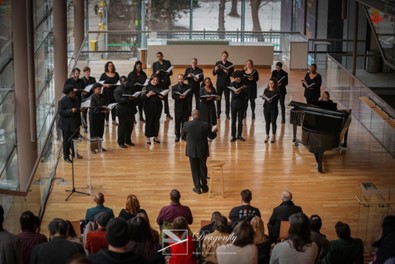
The multi-faceted vocalists of The Nathaniel Dett Chorale perform all styles and genres of music as appropriate to the traditions of Africa and its Diasporas. The Chorale’s mission is to build bridges of understanding, appreciation, and acceptance between communities of people through the medium of Afrocentric choral music.
Founder D. Brainerd Blyden-Taylor named The Nathaniel Dett Chorale after internationally renowned African Canadian composer R. Nathaniel Dett (1882-1943) to draw attention to Dett’s legacy, to the breadth of Afrocentric choral music, and to be a professional choral ensemble where persons of African heritage can be well represented. Currently in its 25th Season, The Nathaniel Dett Chorale is also Artist in Residence at The Harriet Tubman Institute for Research on Africa and its Diasporas at York University.
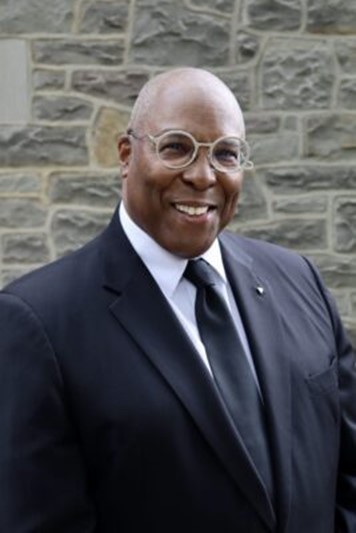
Brainerd Blyden-Taylor
Brainerd Blyden-Taylor is the Founder, Artistic Director and Conductor of The Nathaniel Dett Chorale, Canada’s first professional chamber choir dedicated to the creation, preservation, and performance of Afrocentric choral music of all genres. Mr. Blyden Taylor has worked extensively as an educator at the university, public school, and community levels; and was awarded the degree Doctor of Laws (honoris causa) from York University, Toronto for his service to education. He is in demand as a guest conductor, clinician, adjudicator, and lecturer, both nationally and internationally. Mr. Blyden-Taylor is also an active and dedicated church musician.
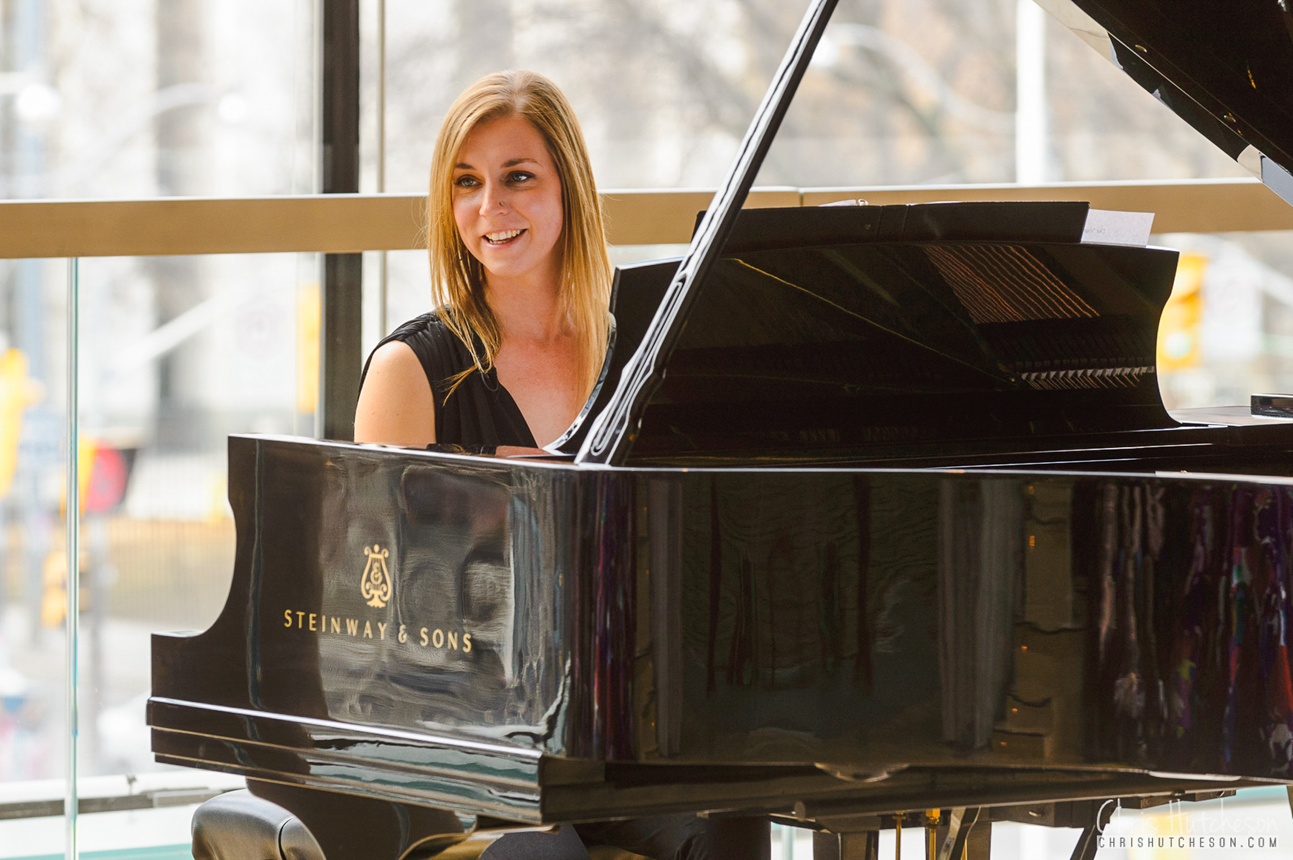
Christina Faye
Christina Faye is an accomplished pianist making her home in Toronto. Originally from Thunder Bay, Ontario, Christina discovered her love for the collaborative arts at the age of nine when she began playing for a local children’s chorus. In 2007 she earned a Bachelor of Music from Brandon University and graduated from the Eastman School of Music with a Master of Music in 2009.
Christina is Director of Music and Organist at Donway Covenant United Church and is in demand as a collaborative and solo pianist. She works with a number of choirs and opera/theatre organisations currently, including the Canadian Children’s Opera Company, The Nathaniel Dett Chorale, and the Toronto Mendelssohn Choir’s ‘Singsation’ series. Christina also performs frequently with instrumentalists, small ensembles and as a soloist.
Education is also a vital part of Christina’s life, and she maintains a small studio of private students, coaches professional and amateur singers and has adjudicated for ORMTA. For several years, Christina has been on staff for the Canadian Opera Company’s summer youth programming, and for TDSB music events. When not at the piano, Christina is most likely to be found riding her horse, Rain, or experimenting with vegan baking!
The Nathaniel Dett Chorale
Sopranos
Lisett Diop (Apprentice)
Alida Doornberg
Nikan Ingabire Kanate
Anaïs Kelsey-Verdecchia
Kaisha Lee
Alison Ryan
Karen Weigold
Altos
Christina Bell
Jenna Cowans
Alexandra Garrison
Alex McArthur
Ianjai Mounsey-Ndemo
Tenors
Nicholas Gough
Galilei Njembo
Alain Paquette
Arieh Sacke
William Salinas-Crosby
Adam Wicks
Basses
Wade Bray
Matheus Coelho
Martin Gomes
Andrew Gunpath
Aidan Reimer
Dérrell Woods
NDC Patrons
THANK YOU TO THOSE WHO SUPPORT OUR VISION
Beverley Bennett
Donald Clements
Sharon Conway
Sheila Flood
Robert Feldman
Alexandra Garrison
Gen Three Ltd.
Yola Grant
Patricia Harland
Wayne Horchver
Aaron Huntly
Stephen & Cheryl Holmes
Ellen Jaaku
Munjeera Jefford
Angela King
Stefan C. Laciak
Gerry Lavallee
Anne Layton & Jamie Isbister
Diana Massiah
John McCracken
Sarah & Mark Perry
Jane Ricciardelli
Celeste Richards
Jackman Family Foundation
Janet Roscoe
Alison Rose
Rita Sanford
Ruth Schembri
Jennifer Singh
Conrad Thomas
Alex Thomson
William Thomson
Six anonymous donors
One anonymous Foundation
Despite our best efforts to avoid errors and omissions, mistakes can occur. If your name is listed incorrectly, misspelled or missed inadvertently, we apologise for any inconvenience this may have caused. We would appreciate being notified of any errors. Please send an e-mail to info@nathanieldettchorale.org
